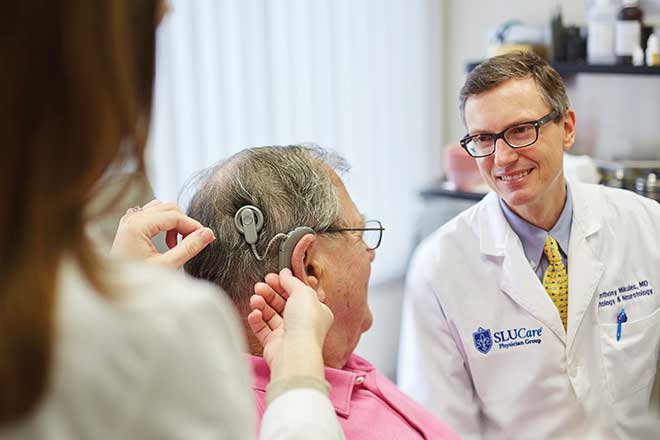Allen Larson’s life revolves around music. As a longtime orchestra conductor—including his current post with the Metropolitan Orchestra of St. Louis—his ears are as essential to the performances as the instruments in the pit. When he noticed a loss in hearing, Larson feared he might have to retire. But first he enlisted help from the hearing specialists at SLUCare Physician Group.
SLUCare takes a collaborative approach between doctors and patients to find the best solution for hearing problems. A hearing test and discussion of the patient’s lifestyle help doctors hone in on the appropriate type of hearing aid and the features it should include, says Dr. Dave Harris, SLUCare audiologist. “Even if a patient comes in with an idea of what they want, we let them know the pros and cons,” he says. “We don’t pressure anyone into anything, but rather help the patient make an informed decision.”
Larson, in the interest of his career, opted for a top-of-the-line device with two volume levels: one for conversation and the other for his work. “If the aid is set at the conversational level when I’m hearing the orchestra, there’s a distortion of sound,” he notes. “By having that second level, I can hear the orchestra clearly.”
Once a patient is fitted with the optimal aid, SLUCare doctors continue to work with them for the remainder of their lives. “It’s no charge to reprogram the aid, no matter how many times a patient returns,” Harris says. In addition, patients get an annual hearing test and a biannual checkup to examine their ears and make sure the aid is performing well.
For patients with more severe loss, SLUCare offers advanced options, including the cochlear implant, a device implanted in the inner ear, and the bone-anchored hearing aid, a surgically implanted device that transmits sound through the bone to the inner ear. SLUCare is one of the few providers offering both aids and implants, Mikulec notes. “Some hearing aid dispensers don’t do implants and may not know when it’s the right time to refer patients for an implant,” he says. “Here, it’s an easy transition.”
This gives options to patients like St. Louisan Bob Kromer, who lost his hearing gradually over decades and tried a variety of aids before turning to SLUCare 18 months ago. Now he has an aid in one ear and a cochlear implant in the other. For Kromer, as for many of SLUCare’s hearing patients, it wasn’t just his hearing that was returned, but his quality of life. “I had always been an outgoing person, but before my cochlear implant, I had become totally withdrawn,” Kromer says. “Now I’m back. I can hear my grandkids and understand them again. It’s a wonderful, wonderful thing.”
Audiologist Sarah Thomas and otolaryngologist Dr. Anthony Mikulec with patient Robert Kromer
Photo Courtesy of SLUCare Physician Group
From fitting patients with the optimal hearing aid to placing cochlear implants, SLUCare Physician Group offers a broad range of hearing-related care. Pictured on the cover: audiologist Sarah Thomas, AuD ; audiologist Dave Harris, Ph.D; otolaryngologist Dr. Anthony A. Mikulec; audiologist Melissa Lowe, AuD ; and audiologist Amy Estill, MA. They practice at Doctors Office Building at 3660 Vista Ave. and Mercy Hospital at 621 S. New Ballad Road. For more information, call 314.977.5110 or visit slucare.edu/hearing.
